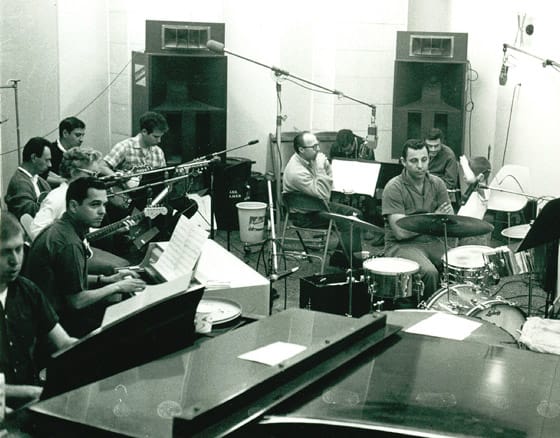The film world's latest attempt to let no great musical act go unheralded, The Wrecking Crew celebrates the coterie of studio musicians who helped shape rock's early years on the West Coast. Best known as the men (and woman) behind Phil Spector's "Wall of Sound" and Brian Wilson's "Teenage Symphonies," the group's members can be heard on an amazingly diverse range of recordings from the Byrds' "Turn, Turn, Turn," to the theme song to Bonanza. As impressive as their contributions to pop music are, their sprawling size ensures that there's no clear path to telling the Wrecking Crew's story.
That didn't stop first time director Denny Tedesco, son of Wrecking Crew guitarist Tommy Tedesco, from trying. Though its membership is vaguely defined, he nevertheless speaks with every key player, including eventual solo stars Glen Campbell and Leon Russell, often filming groups of the musicians together in a kind of round table. The camaraderie is palpable, and their stories illuminate the nature of the industry at the time.
As jazz and pop gave way to rock'n'roll, the music industry's gaze was drawn west, away from the dominance of New York's Brill Building. A new breed of sessions player was required, one who was willing to indulge the creative whims of these new, young stars. Out were the "blue jackets," in were the Wrecking Crew who, it turns out, not only played on more of your favourite records than many originally thought, they even came up with some of the signature era's defining riffs and licks, too.
Tedesco manages to line up an impressive list of talking heads like Herb Alpert, Nancy Sinatra and Cher to sing the Crew's praises, but the film is abnormally structured, segmented into blocks or chapters that don't necessarily add up to a single narrative. Some players, like Hal Blaine and Caroline Kaye, get their own chapters; others don't. And there's little effort made to connect the work this group did to today's music world.
The Wrecking Crew almost immediately brings to mind Standing in the Shadows of Motown, the film that, a decade ago, brought to light the artistic triumphs of Motown's own house band. That film succeeded thanks to tight storytelling wrapped around a reunion concert that found the band backing contemporary stars. Without a discernable framing device, the Wrecking Crew can't help but pale in comparison.
(VSC)That didn't stop first time director Denny Tedesco, son of Wrecking Crew guitarist Tommy Tedesco, from trying. Though its membership is vaguely defined, he nevertheless speaks with every key player, including eventual solo stars Glen Campbell and Leon Russell, often filming groups of the musicians together in a kind of round table. The camaraderie is palpable, and their stories illuminate the nature of the industry at the time.
As jazz and pop gave way to rock'n'roll, the music industry's gaze was drawn west, away from the dominance of New York's Brill Building. A new breed of sessions player was required, one who was willing to indulge the creative whims of these new, young stars. Out were the "blue jackets," in were the Wrecking Crew who, it turns out, not only played on more of your favourite records than many originally thought, they even came up with some of the signature era's defining riffs and licks, too.
Tedesco manages to line up an impressive list of talking heads like Herb Alpert, Nancy Sinatra and Cher to sing the Crew's praises, but the film is abnormally structured, segmented into blocks or chapters that don't necessarily add up to a single narrative. Some players, like Hal Blaine and Caroline Kaye, get their own chapters; others don't. And there's little effort made to connect the work this group did to today's music world.
The Wrecking Crew almost immediately brings to mind Standing in the Shadows of Motown, the film that, a decade ago, brought to light the artistic triumphs of Motown's own house band. That film succeeded thanks to tight storytelling wrapped around a reunion concert that found the band backing contemporary stars. Without a discernable framing device, the Wrecking Crew can't help but pale in comparison.




